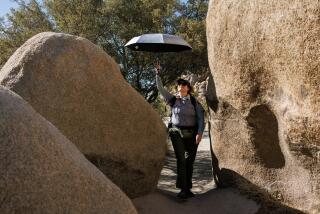Right Choices Key to Outdoor Survival
- Share via
ROSEBURG, Ore. — The difference between surviving an unexpected night in the wilderness and not is what’s between your ears.
“Surviving is a decision-making process,” says survival expert Peter Kummerfeldt. “If you make good decisions, you’ll survive. Make bad decisions and you may be an obituary.”
Kummerfeldt, 52, spent most of his 30 years in the U.S. Air Force as a survival instructor, the last 12 as survival-training director at the Air Force Academy in Colorado Springs, Colo.
When he retired from the Air Force in 1995, his Survival Consultant Group, which had been a hobby for several years, became a full-time job. He spends about seven months a year traveling from his Colorado Springs home and presenting seminars on such subjects as outdoor emergencies, equipment and rescues.
Kummerfeldt was in Portland recently, addressing a group of big-game hunters.
“You should expect to spend a night out--so you should plan for it,” he told the group, noting that any number of circumstances--such as stormy weather, injury or illness could result in an unexpected overnight stay.
“You can’t necessarily anticipate an incident, but you can anticipate the potential of something happening,” Kummerfeldt said.
At the top of the list, Kummerfeldt said, is clothing. The objective in selecting clothes and footwear is to stay warm and dry no matter what the weather might offer.
“We dress to arrive, not to survive,” Kummerfeldt said. “That ought to be reversed. Try to get the best clothing you can afford, which will get you through the worst-case scenario.”
There are skills that can be developed in a backyard to help a person prepare for a night out. Those skills include building a shelter and a fire in all conditions.
“If you have good clothing, you may not need shelter or fire, but an inability to build a shelter or fire may result in an unhappy ending,” Kummerfeldt said. “You need to have a foolproof, reliable way to get a fire going.”
He recommended stormproof, windproof matches, lighters and a metal match holder, so that you can produce a spark no matter what the weather. Then he recommended practice.
As far as food and nutrition, Kummerfeldt carries a quart of water, an iodine solution that kills bacteria in water, and several high-energy bars.
Kummerfeldt also recommends being familiar with maps and compasses, which can prevent an unplanned night out by “staying found.”
“You may not be as lost as you think you are,” he said. “One of the basic rules is to know what to do with a map and compass.”
But at the point a person decides to spend a night out, Kummerfeldt stressed the STOP scenario--Stop, Think, Observe, Plan.
“You absolutely cannot function in a panicky mode,” he said. “You need to consider, ‘What do I need, what do I have?’ Don’t throw away anything.
“When in a state of panic, all you want to do is move and probably at a high rate of speed. That drastically increases the risk of injury and increases dehydrating yourself.
“Dehydration is the No. 1 medical problem in the outdoors,” Kummerfeldt said. “Many accidents in the outdoors can be traced back to dehydration. When there’s not enough water in individual cells, they begin to break down, the body breaks down, the brain’s ability to function is impaired, and mistakes are made.
“The act of taking a drink of water has a tremendous calming effect. Dehydration and hypothermia are reasons for senseless deaths.”
Kummerfeldt said it is also important to talk aloud.
“When you talk out loud, you talk positively,” he said. “ ‘This is an event I can cope with. I can do it.’ When you talk silently to yourself, it’s usually negative.”
When lost, experts say the best bet for survival is to sit tight and let rescuers come to you. While waiting, blowing a whistle, using a signal mirror and using color as a ground marker increase the chances of being found.
“As difficult as that may be because of boredom and loneliness, staying put is best,” Kummerfeldt said. “If you move, you may move into an area that’s already been searched.
“People tend to underestimate distance and overestimate their ability to travel.”
More to Read
Sign up for The Wild
We’ll help you find the best places to hike, bike and run, as well as the perfect silent spots for meditation and yoga.
You may occasionally receive promotional content from the Los Angeles Times.






